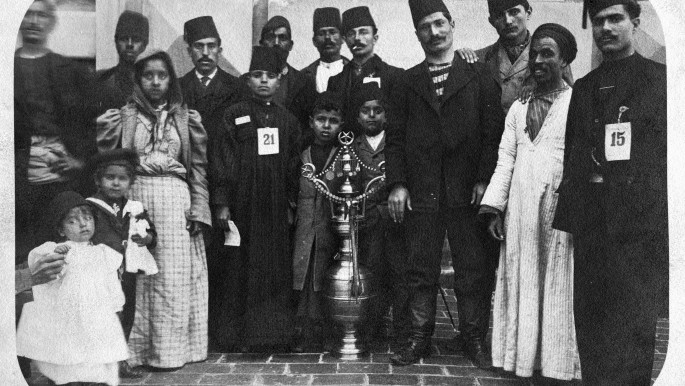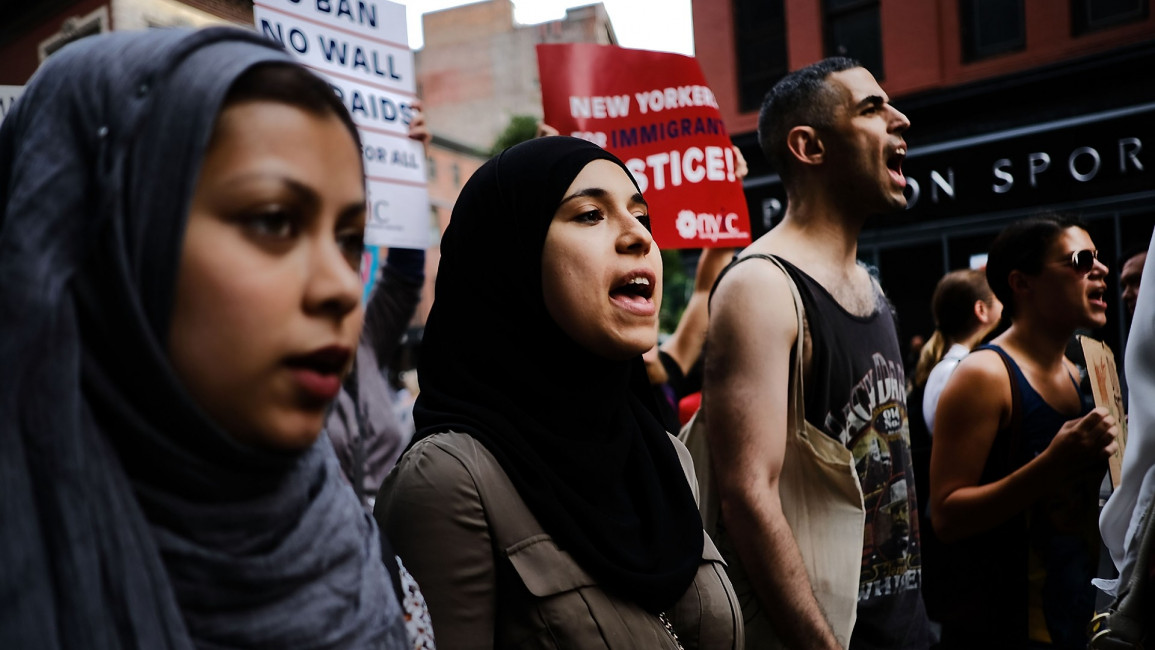
Our Arab American forefathers left us a legacy we can't afford to ignore
"They are sending us not the right people. It's coming from more than Mexico... and it's coming probably from the Middle East."
That speech became the first of several attacks on Arab and Muslim immigrants, many of which culminated in action like the infamous "Muslim Ban", which - in its initial form - banned Syrian refugees and citizens of seven predominantly Muslim countries.
However, Trump is not the first politician to ban Arab and Muslim immigrants, or even the first to refer to them as trash. When we look back, we see the story of Arab immigration in this country as a narrative not only fighting for the right to be an Arab citizen in America, but defining what that means.
On 29 April 1929, Pennsylvania Senator David Reed advocated an even stricter immigration quota than the one conceived four years earlier which limited the number of Syrian immigrants.
"This country was the trash basket of Europe," Reed announced. "We were sent thousands of immigrants who were excused from penitentiary sentences on conditions that they would emigrate to America. We got the trash of the Mediterranean, all that Levantine stock that churns around there."
However, just as people denounced Trump's rhetoric, so did the Syrian community in America denounce Reed.
 |
Beyond lynchings, social alienation, and store burnings, Arabs in America were forced to continually justify their right to live as citizens |  |
"What has made the honourable senator from Pennsylvania so blunt, so harsh, so unfair, - so blusterous, so cocky?" responds Labeebee A.J. Hanna, a young Syrian American in The Syrian World, an Arab American newspaper. "Every Syrian knows, and those who have troubled to investigate know, that Syrians come to this country of immigrants (for are we not all of us immigrants, no matter how many generations back?) Syrians come here to make homes. They are peaceful and law-abiding, and they love America. They give fairness and demand fairness."
Labeebee A.J. Hanna was among the first generation of American-born Arabs who grew up in Boston in a vibrant Arab diaspora in the early twentieth century, whose history has been lost to the public eye.
 |
|
| Immigrants from the Ottoman Empire arrive at New York's Ellis Island in 1907 [Getty] |
By conservative estimates, between 1899 and 1911, over 100,000 Syrians immigrated to the United States, settling in large communities housed in New York, Massachusetts, Louisiana, and Michigan. From the then Ottoman Empire, the immigrants brought their cuisine, their trades, and their Arabic printing presses. Publishing houses evolved into community hubs, serving as communication channels between American Syrians and the other major Syrian enclaves in Sao Paulo, Buenos Aires, and Cairo.
Preserved in the periodicals which emerged from printing houses like those on New York's Washington Street are the stories of the first Arabs to arrive in America and their struggle to define who they were as Arabs living there.
We can see their experiences reflected in our own: trying to preserve Arabic among the newer generations, feeling helpless in response to political upheaval overseas, fighting against marginalisation in their own communities.
 |
It is true that we inherited their fight, but we also inherited their hope and their triumph |  |
Like us, they lived in an America which often loudly proclaimed it did not want them. Beyond lynchings, social alienation, and store burnings, Arabs in America were forced to continually justify their right to live as citizens, whether by appealing for their racial whiteness as a foundation for their citizenship in courtrooms, or else attempting to prove that assimilation did not mean abandoning their Arab heritage.
Like us, they found the task difficult. "We are at a loss whether to succumb to tradition, or die for experiment," writes Edna K Saloomey of her generation. For years, the question lingered: what does it mean to live in this country as an Arab American citizen?
Men like Senator Reed scoffed in 1929 at the idea: "How can anyone expect an Arab, who has lived under some patriarchal government where he did not even dare whisper his views, to come over here and participate intelligently in the American processes of democracy?"
And yet immigrants to this country have proven time and time again that they do not take democracy for granted. They fought to achieve it, and witnessed the consequences of failure. The Arabs of the twentieth century saw the Ottoman clampdown on their homes in the Middle East, just as the Arabs of the twenty-first century saw dictators set both democratic protests and countries aflame.
In the face of discrimination, as Arab immigrant after Arab immigrant was brought before American courts and denied citizenship, the community responded with appeal after appeal. And, as Salloum Mokarzel writes in 1928, "They brushed aside their petty causes of difference and rose in common and with the closest approach to unanimity to engage in the task of self defence. And they won.
Arabs in America are exceptionally diverse. Our demographics have changed since the first immigrants came here, but unlike what Trump - blunt, blusterous, and cocky, as he is - seems to believe, we have a history of living and arriving in America just like every other American community.
He is not the first to dismiss us, nor the first to ban us. When we flip through the pages of those who came before us, they speak beyond their own times and join our conversations. It is true that we inherited their fight, but we also inherited their hope and their triumph.
 |
In voting, we prove that we understand the value of democracy and citizenship in the face of a history which mocks us |  |
Kahlil Gibran, eminent Lebanese-American writer, poet, and artist who lived in New York City's Arab enclave, dedicated a poem "To Young Americans of Syrian Origin" in 1926 to the youth of America struggling to define what it means to be a good Arab citizen of America. He writes:
It is to acknowledge the other person's rights before asserting your own, but always to be conscious of your own.
It is to be free in thought and deed, but it is also to know that your freedom is subject to the other person's freedom.
It is to create the useful and the beautiful with your own hands, and to admire what others have created in love and with faith.
It is to produce by labour and only by labour, and to spend less than you have produced that your children may not be dependent on the state for support when you are no more.
It is to stand before the towers of New York, Washington, Chicago and San Francisco saying in your heart, "I am the descendent of a people that builded Damascus, and Biblus, and Tyre and Sidon, and Antioch, and now I am here to build with you, and with a will."
Gibran's definition of a good citizen is one which feels especially poignant in this moment of upheaval and uncertainty. It is one we can write in address to Reed, teach to Trump, and more importantly, take to the polls.
In the coming months, when we cast our vote, we do so cognisant of not only our rights, but those of our neighbours. When we wear our masks and man the polls, we do so with respect for our communities. In voting, we prove that we understand the value of democracy and citizenship in the face of a history which mocks us.
Like Hanna, and like Gibran, I believe in the young Americans of Arab origin. Vote on 3 November.
Zaina Ujayli is an MA student at The University of Virginia focusing on nineteenth and twentieth century Arab and Arab American writers.
Follow her on Twitter: @zainaujayli
Have questions or comments? Email us at: editorial-english@alaraby.co.uk
Opinions expressed here are the author's own, and do not necessarily reflect those of her employer, or of The New Arab and its editorial board or staff.




